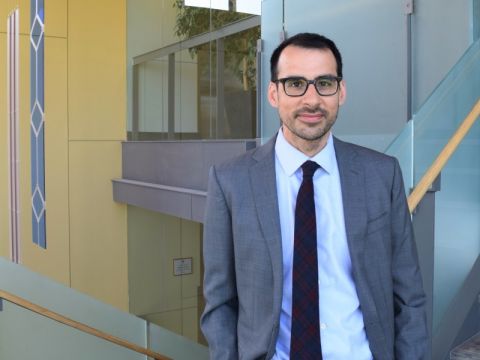
Fast Facts on Colin Grey
- Law Degrees:
- BA (Dartmouth), LLB (Toronto), LLM, JSD (New York University)
- Hometown:
- Ottawa and Montreal
- Research Area:
- Immigration law; public law; legal, political and moral philosophy
Professor Colin Grey, a former legal advisor with the Immigration and Refugee Board of Canada, is the newest addition to the Queen’s Law faculty. For the past four years, he has been a professor at the Département des sciences juridiques at the Université du Québec à Montréal (UQAM). Grey, who holds LLM and JSD degrees from the New York University School of Law, focuses his research on immigration law and legal philosophy. He is author of Justice and Authority in Immigration Law (Hart Publishing, 2015), and co-author and co-editor of the leading Canadian casebook on immigration law. His articles have appeared in Legal Theory, Philosophy and Social Criticism, and the Canadian Journal of Law & Jurisprudence. In the upcoming academic year at Queen’s Law, he’ll be teaching Administrative Law and developing four courses for the new online Graduate Diploma in Immigration and Citizenship Law.
A few days after arriving on Queen’s campus, Professor Colin Grey shares his personal and professional interests.
Why did you decide to join Queen’s Law?
In addition to being a top Canadian law school and a world-class institution, what excites me about Queen’s is the number of other faculty members doing work that dovetails with mine. I will be collaborating with Professor Sharry Aiken on a number of projects – including the new online Graduate Diploma in Immigration and Citizenship Law and a new edition of a casebook on immigration law. In addition, there is simply a large number of emerging or more established scholars doing what I consider to be path-breaking work in legal and political philosophy. I got a taste of that during my job talk, which was probably one of the most stimulating conference presentations I had ever given.
What got you interested in your area of law?
I think many people’s research is disguised autobiography. At least that’s true in my case. Immigration and migration have interested me from a young age, probably because both my parents were immigrants to Canada – my mother from Guyana, my father from Chile and Scotland. Early on, much of my interest in immigration was channelled into literature. When I took immigration law at law school later on, I found myself surprised (shocked, really) at the way constitutional protections seem so much weaker in this domain. Once I looked into it, I was even more distressed to learn how little political philosophy had to say about justice in immigration. This was brought home to me when – 15 years ago (!) – I read John Rawls's A Theory of Justice, during a solo hike in Killarney Provincial Park. Rawls, like most major political philosophers at the time, said almost nothing about immigration during his career. Since then my focus has really been thinking through how our theories of law and politics ought to apply in the area of immigration.
Tell us about your research.
As the above indicates, my research focuses mainly on questions of political philosophy and legal theory as they relate to immigration law. I think we have a relatively poor understanding of how ideals like justice, legitimacy, the rule of law, and democracy feature, or ought to feature, in this area. And I think the result, in general, is that much of that law is arbitrary and so leads to greater vulnerability and more harm to migrants. I also believe there is insufficient assurance that debates over migration and the law that governs it are not a mere a clash of ideologies. I developed some of these thoughts in my book, Justice and Authority in Immigration Law, which was based on my dissertation, as well as in a few articles I have published since then. My current projects include an article examining why serious criminals are excluded from refugee protection, even under international law. I have also been working for quite a while now on a series of articles on how we should take into account the political instability and polarization that immigration seems to cause when we theorize about the justice in this area.
What are you most proud of?
The honest answer is my kids.
Any hobbies or interests?
Apart from the usual – reading, exercising, ikebana, etc. – lately I’ve been doing a fair bit of dungeon-mastering for my kids.